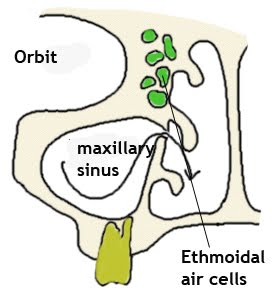Chronic maxillary sinusitis
Contents
Chronic maxillary sinusitis:
Is defined as infections involving the maxillary sinus lasting for more than 3 monthsChronic infections are common in maxillary sinuses because of its:
1. Non dependent drainage pathway
2. The close proximity of its drainage channel to anterior ethmoidal air cells.
Aetiology:
1. Commonly follows acute sinusitis
2. In Kartagener's syndrome it is common
3. Dental sepsis (Due to the close proximity of upper premolars and molars to its floor)
4. Allergy
5. Deviated nasal septum blocking its drainage
6. Fungal infections
7. Iatrogenic causes: Nasal packing, Naso gastric tube insertion
Types of chronic maxillary sinusitis:
1. Hypertrophic / Polypoidal sinusitis: This is also known as catarrhal sinusitis. The inflammation mainly affects the efferent vessels and lymphatics. To start with there is periphlebitis and perilymphangitis. Repeated such attacks may cause oedema and polypoidal changes in the mucous membrane lining the sinus cavity.
2. Atrophic sinusitis: Also known as suppurative sinusitis. The main pathology lies in the afferent vessels causing a thickening of the vessel walls. Oedema is not a feature of this type of sinusitis. Both types of sinusitis can coexist in the same sinus.
Clinical features:
1. Nasal obstruction
2. Post nasal drip
3. Epistaxis
4. Abnormalities of smell (cacosmia, parosmia, or hyposmia)
5. Vestibulitis
6. Headache
7. Eustachean tube block
8. Secondary tonsillitis
9. Laryngitis
Clinical findings:
Anterior rhinoscopy shows swollen mucosa with pus in the middle meatus. Pus can be made to appear by making the patient to put the head between the knees for a few seconds before anterior rhinoscopic examination.Patients may have post nasal drip and granular pharyngitis.
Investigations:
X-ray paranasal sinuses water's view shows haziness of the affected maxillary sinus. CT scan is diagnostic. It will reveal the exact cause for this infection.
Management:
1. Antibiotics (Penicillin or amoxycillin are the drugs of choice)
2. Antihistamines
3. Decongestant nasal drops to decongest the nasal mucosa
Minor surgical procedure like antral wash.
Intranasal antrostomy
Caldwel luc surgery in resistant cases.
FESS is the preferred modality of treatment these days
